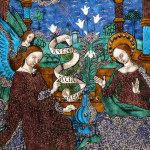We run our website the way we wished the whole internet worked: we provide high quality original content with no ads. We are funded solely by your direct support. Please consider supporting this project.
The Lord of Legend and Love
However secularized a person may be, if they have any sense at all that life has a meaning, they know it must have something to do with love. Indeed, one could argue that all of our intuitions about morality and the meaning of life are at root an intuition about the supremacy of love. At the core of our being we sense that love is supposed to reign over all. We long for love in all its expressions –intimacy, goodness and justice – to overcome all its obstacles – isolation, evil and oppression. This conviction lies behind our ceaseless strivings to make the world a kinder, more just, place.
Of course, the worldview a person consciously embraces may not be able to make sense of this profound intuition. They may, for example, believe that only physical matter is real and that there is, therefore, no objective reality to moral convictions and no overarching purpose to life. Still, if they are at all emotionally, psychological and spiritually healthy, they will live like morality does objectively exist and as if there is a purpose to life, and this purpose has something to do with love. The dream of love reigning supreme is not easily extinguished.
This enduring dream of love has been expressed in myths and legends throughout time. While most love stories are between lovers (for example, Helen of Troy and Paris, Romeo and Juliet) some are between gods (for example, Ariadne and Dionysos) and some even between a god and a human (for example, Aphrodite and Adonis). Stories of love between gods have fallen out of favor in recent times in western secular culture, but extravagant love stories between people obviously abound – James Cameron’s 1997 movie, “Titanic,” being one of the more famous examples in recent years. And one yet finds an occasional love story of a god (or angel) sacrificing all for the love of a human – Brad Siberling’s 1998 movie “City of Angels” being one recent instance of this. Like all legends and myths, these stories express, in a variety of ways, a primordial dream.
It’s the dream of love that almost unquenchably lies at the heart of every human being.
Now, if the depth of one’s love can be measured by the sacrifice one is willing to make for the beloved – and what better indicator of love is there than this? – then the Jesus story must be judged as not only the greatest love story ever told, but the greatest love story that ever could be told. For this is a story of the all-powerful Creator God making the greatest conceivable sacrifice for a race of people who didn’t deserve—or even desire—it. No story could be imagined in which a lover sacrificed more for a beloved who deserved it less. No greater sacrifice, and thus no greater depth of love, could be imagined than this. Indeed, this is a story of infinite love, for in this story the lover crosses an infinite distance and pays an infinite price to win a completely undeserving beloved.
In this sense, the Jesus story climaxes and fulfills the dream of all legendary or mythic love stories. To use Tolkien’s terminology, this love story embraces the essence of all love stories. It has a “peculiarly artistic, beautiful, and moving” quality to it that is “mythical” in its perfection. This story thus constitutes “the greatest and most complete conceivable eucatastrophe” (eruption of ecstacy) found in love stories. (1) All other love stories are approximations of this one.
And yet, this love story gives us compelling reasons to conclude that it is not merely myth or legend. (See P. Eddy & G. Boyd, The Jesus Legend). In the Jesus story, we are dealing with real history. We are thus given compelling grounds for concluding that in Jesus, perfect love has entered real history. The lover pointed to in all love mythology has become the Lord Incarnate.
In fact, the way in which the Jesus story fulfills the myth-making intuitions of the human heart, especially our most fundamental intuition about love, gives us yet one more reason for concluding that this story cannot be merely myth, but must rather be rooted in history. For only if this story is historically true can we adequately explain why we long for it – or something like it – to be true.
As C. S. Lewis pointed out years ago, nature tends not to produce beings that long for things nature itself does not supply. We grow hungry only because there’s such a thing as food. We get thirsty only because there’s such a thing as water. We have sex drives only because there’s such a thing as sex. Human drives and desires seem to point to realities that fulfill them. (2) If we can get philosophical for a moment, we might say that intuitive longings have ontological implications. They tell us something about the real world.
In this light we have to ask: What is the reality to which our myth-making intuitions about, and longing for, perfect love points? If this is what drives us, what is the reality it is driving us toward?
We submit that in Jesus we find our answer. If our Creator is in fact like this – a human being dying a hellish death out of love for those who were killing him – then we can begin to understand why we are like we are. Our hope-filled dreams of love get expressed in legend and mythology because they outrun anything we find in the world – and now we can begin to understand why. We dream beyond the world because we are made for someone beyond this world. We are created by God and for God, and as Augustine said, our hearts cannot rest until they rest in God. (2) We are created to love and be loved by a God who is, from eternity to eternity, perfect, unsurpassable, incomprehensible, infinite love.
Paul and the Gospels proclaim that, out of his unfathomable love, the God whom we restlessly long for has come into our world. In Jesus, God entered our domain to fulfill our dreams. He has come to unambiguously reveal who he is and what he is like. Against everything we’ve imagined “God” or “the gods” to be, Jesus shows us that our Creator is a God who is willing to be crucified to redeem sinners. He has come to reveal to us who we are. We are rebels who are nevertheless loved by our Creator with an unconditional love. And he has come to set us free from the power of evil that enslaved us and ultimately to restore the entire creation to what he always wanted it to be. He has come ultimately to extinguish the kingdom of darkness and establish the kingdom of God, in which his perfect love, joy and peace shall someday reign without opposition.
In our heart of hearts, if we’re honest with ourselves, we want to believe this story is true. Yet, again if we’re honest with ourselves and investigate the matter openly, the Gospel give us compelling grounds for concluding that the story actually is true.
Of course, accepting that the Jesus story is rooted in history and placing your trust in Jesus requires faith, for it is impossible to “prove” any historical claim with absolute certainty. However, rejecting the story and basing your life on the assumption that the story is only a myth or a legend also takes faith, for it is equally impossible to “prove” this claim. On the basis of the historical evidence along with the otherwise inexplicable desire of the human heart, I submit that the first act of faith is much more reasonable than the second act of faith.
What will you choose to believe and how will you choose to live? However you answer this question, you are exercising faith. You are deciding to live your life either on the conviction that the story is rooted in history or on the conviction that it is not. And while reasons certainly can be given for choosing one option over the other, neither option can be strictly “proven” (i.e., as one would “prove” a mathematical equation).
However we live, we live by faith. What will you put your faith in?
* This essay is adapted from G.Boyd & P. Eddy, Lord or Legend? (Baker, 2007).
Endnotes
(1) J. R. R. Tolkien, “On Fairy-Stories,” in his Leaf and Tree (Boston: Houghton Mifflin, 1965) 71-72
(2) C. S. Lewis, Mere Christianity (New York: Macmillan, 1943)
(3) Augustine, Confessions I, 1.
Category: Essays
Tags: Apologetics, Essay, Faith
Topics: Jesus: Lord or Legend
Related Reading

The Cruciform Center Part 3: How Paul’s Epistles Reveal a Cruciform God
As we’ve discussed, the four Gospels point to a cruciform revelation of God (click here and here for a review), but what about the most widely read writer of the New Testament? What did the Apostle Paul have to say about how the cross reveals who God is? Before turning to Paul’s writings, I’d like…

Why Believe the Virgin Birth Accounts?
Some skeptics claim that the story of the virgin birth of Jesus is derived from similar stories from pagan literature. While I won’t address here the details of the various parallels that some use to argue this point—as it has been demonstrated by many scholars that they simply don’t hold up to scrutiny—I will offer…

When God Abandoned God
On the cross, Jesus’ cried out, “Eli, Eli, lema sabachthani?” – which means, “My God, my God, why have you forsaken me? (Mt. 27:46). These are arguably the most shocking, beautiful, and profoundly revelatory words found in Scripture. The cry reveals that on Calvary, the all-holy Son of God experienced God-forsakenness as he bore the…

The End and Beginning of Faith
Eduardo Amorim via Compfight Micah J. Murray shared the story of how his doubts and loss of faith led him to a truer, deeper faith. While we fear the doubts that sometimes sneak in, sometimes those doubts lead us to a place of goodness. Be not afraid. From Micah’s story: Eventually I gave up on…

Is Your Church Promoting Tribalism?
It’s long been said that Sunday morning is the most segregated time of the week. Sadly, many have taught us that homogeneity is the way the church grows the fastest. But should we put up with this? In what follows, Greg lays out a biblical foundation for what he calls “reversing Babel.” According to the…

Scientific Support for the Open View
If a position is true, every avenue of reflection ought to point in its direction. What follows are two more “pointers” to the view that the future is at least partly open (indefinite, composed of possibilities). I’ll first consider an argument from quantum physics, followed by a pragmatic argument regarding what we ordinarily assume to…
